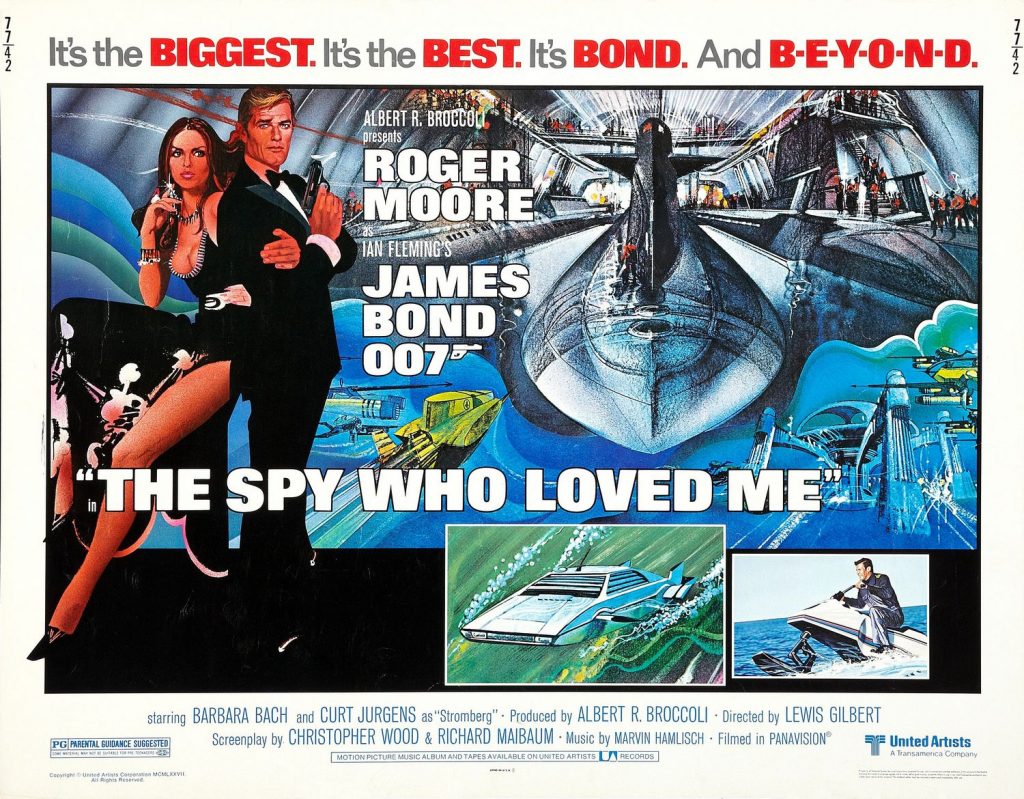The Spy Who Loved Me (1977)
THE CAST: Roger Moore (James Bond); Barbara Bach (Anya Amasova); Richard Kiel (Jaws); Caroline Munro (Naomi); Curt Jurgens (Karl Stromberg)
THE SUPPORTING CAST: Bernard Lee (“M”); Desmond Llewelyn (“Q”); Lois Maxwell (Moneypenny); Walter Gotell (General Gogol); Geoffrey Keen (Minister of Defense); Robert Brown (Admiral Hargreaves); Vernon Dobtcheff (Max Kalba)
CREDITS: Produced by Albert R. Broccoli; Directed by Lewis Gilbert; Screenplay by Christopher Wood and RIchard Maibaum; Music by Marvin Hamlisch; Theme Song performed by Carly Simon; Lyrics by Carol Bayer Sager; Titles by Maurice Binder; Edited by John Glen; Running Time 2 hours and 4 minutes
MISSION: Bond and his Russian counterpart, Agent XXX, must stop a megalomaniacal madman from destroying Moscow and New York and setting up his underwater base Atlantis as the seat of a new world order.
VILLAIN`S IDIOSYNCRASY: Obsessive love of the sea.
LOCATIONS COVERED: Sardinia; Eygpt; Austria
RELEASE DATES: U.S. July 13th, 1977; U.K. July 7th, 1977
BOX OFFICE: $185.4.6 million worldwide ($519,187,541.78 worldwide in 1998)
MUSIC NOTES: “Nobody Does It Better”, sung by Carly Simon, was a smash hit and placed as high as #2 on the US Billboard Top 100.
BEST LINES: “Out of order” sign placed on the body of Max Kalba that was left lying in a phone booth.
“Egyptian builders” Bond says to himself as a pile of bricks falls down upon him.
Review by: Michael Kersey
The Spy Who Loved Me was a renaissance, of sorts, for the Bond series, which had been suffering from a lack of confidence after the tepid release of “The Man With The Golden Gun”. Harry Saltzman had sold his share of the Bond rights, while Kevin McClory was beginning to make noise with his attempts to get his rights to remake Thunderball off the ground. Between 1974 and 1977, Bond was facing his toughest opponent: himself. Everyone involved with bringing The Spy Who Loved Me to the screen knew the stakes. Another misstep could be the end of the series.
Fortunately for Bond fans around the world, The Spy Who Loved Me was a winner, and insured that the series would continue. It features one of Roger Moore`s two best performances as 007. It teams him up with an equally capable female Russian opposite, a megalomaniacal villian, and henchmen that range from the beautiful to the ugly. The storyline hop, skips, and jumps from Austria, to Eygpt and on to Sardinia. Ian Fleming never cared much for his own novel and therefore stipulated that the book could only be used in title only (which wasn`t a problem since the series had been gradually less faithful to the books with each passing film). In order to get back to the grandiose, larger than life type of film You Only Live Twice represented , the producers went back to You Only Live Twice and took it`s plot and it`s director, Lewis Gilbert.
The film takes off with Bond on a mission in Austria. He`s recalled back to London on emergency, but before he can leave, the woman he`s currently dallying with double crosses him and reports his location to a team of Russian scouts ready to assassinate him. Bond manages to elude his persuers on skis by flying off a 3000 ft. tall cliff and parachuting safely to the bottom, but not before killing several of the agents that were after him.
Bond then is assigned to retreive the blueprints of a submarine tracking system that`s being sold on the black market. Both the Russians, British and Americans are missing submarines, with the East blaming the West and vice versa. But the KGB and MI6 also believe a third party could be involved and thus assign their best agents to the case. Sparks fly as Bond and XXX engage in a game of one upsmanship, each trying to get their hands on the microfilm and make the other look inferior. In the process, the game masks deeper feelings that that the two have grown for one another.
Most everything is top notch in the film. Great song, soundtrack, locations, pretitle sequence, and titles. Moore is better than in The Man With The Golden Gun because he`s able to successfully blend humor with a harder edge. He has a better script to work with and is thus allowed to let his trademark humor shine through. Bach, on the other hand, has a more difficult time with the accent, but good looks and great lines go a long ways toward covering over any inadequacy.

